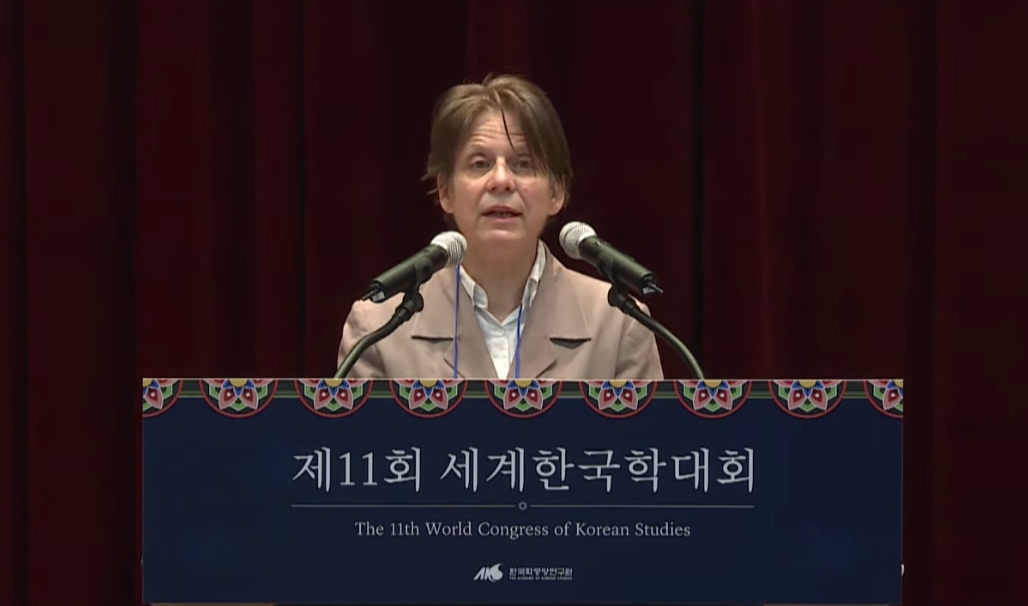 |
Marion Eggert, president of the Association for Korean Studies in Europe, speaks at the 11th World Congress of Korean Studies. (The Academy of Korean Studies' YouTube channel) |
International Korean Studies scholars gathered on Thursday for two-day discussion on the opportunities and challenges posed by the “once-unimaginable” global popularity of Korean culture, at a forum held in-person for the first time since the pandemic.
The 11th biannual World Congress of Korean Studies kicked off at the Academy of Korea Studies headquarters in Seongnam, south of Seoul, with some 120 scholars in attendance, the host Academy of Korean Studies said. Concurrently held online, officials estimated a total of 300 participants for the two-day event.
This year’s theme focused on the rising interest in Korean culture globally as scholars of Korean Studies from multiple countries put their heads together to come up with ways to tap into the field’s momentum in academia.
Marion Eggert, President of the Association for Korean Studies in Europe, said the growth of Korean culture’s popularity had been “unimaginable” in her younger days.
“When I was a student in Munich in the 1980s, the Bavarian State Library kept its file cards on Korean books in a drawer titled Japan. Even 10 years ago, when I wanted to transfer money to Korea, the bank officer asked me to write down the name of the country on a slip of paper,” she said.
“Today, learners of Korean language outnumber learners of any other East Asian language in many European countries.”
Korean Studies scholars have to find ways to tap into the momentum, she said.
“It is our task, as scholars of Korean Studies, to build on that base and diversify interest and knowledge about Korea, its rich cultural heritage and complex contemporary situation beyond what is transmitted by the culture industry.”
The two-day event features some 120 dissertation presentations on 28 panels consisting of scholars from multiple countries including Germany, Spain and Australia on topics ranging from literature, history and culture, among many others.
“Korean pop culture that has been loved the world over such as K-pop and K-drama will be discussed by multiple panels,” said AKS Chairperson Ahn Byung Woo. Korean culture is not limited to certain cultures or fields, he added.
“(Korean culture) is what Korea and Koreans have produced, an achievement made by interacting with the world. So to understand it better, we need to discuss it comprehensively and deeply. I hope the World Congress of Korean Studies proves that opportunity.”
Andrew Jackson, a professor of Korean Studies at Monash University in Australia, said funding remains critical to quality Korean education, as universities are tightening their budgets for humanities departments.
“I was at a university with funding and the opportunity and difference was night and day in terms of student experience, the teacher’s experience and the relationship between Korean Studies and the university,” Jackson said.
Citing data from his university, he added that popular culture is the biggest draw for people to Korean Studies.
“North Korea is well down the list. That wasn’t always the case, but it is now.”




![[Exclusive] Hyundai Mobis eyes closer ties with BYD](http://res.heraldm.com/phpwas/restmb_idxmake.php?idx=644&simg=/content/image/2024/11/25/20241125050044_0.jpg)
![[Herald Review] 'Gangnam B-Side' combines social realism with masterful suspense, performance](http://res.heraldm.com/phpwas/restmb_idxmake.php?idx=644&simg=/content/image/2024/11/25/20241125050072_0.jpg)

